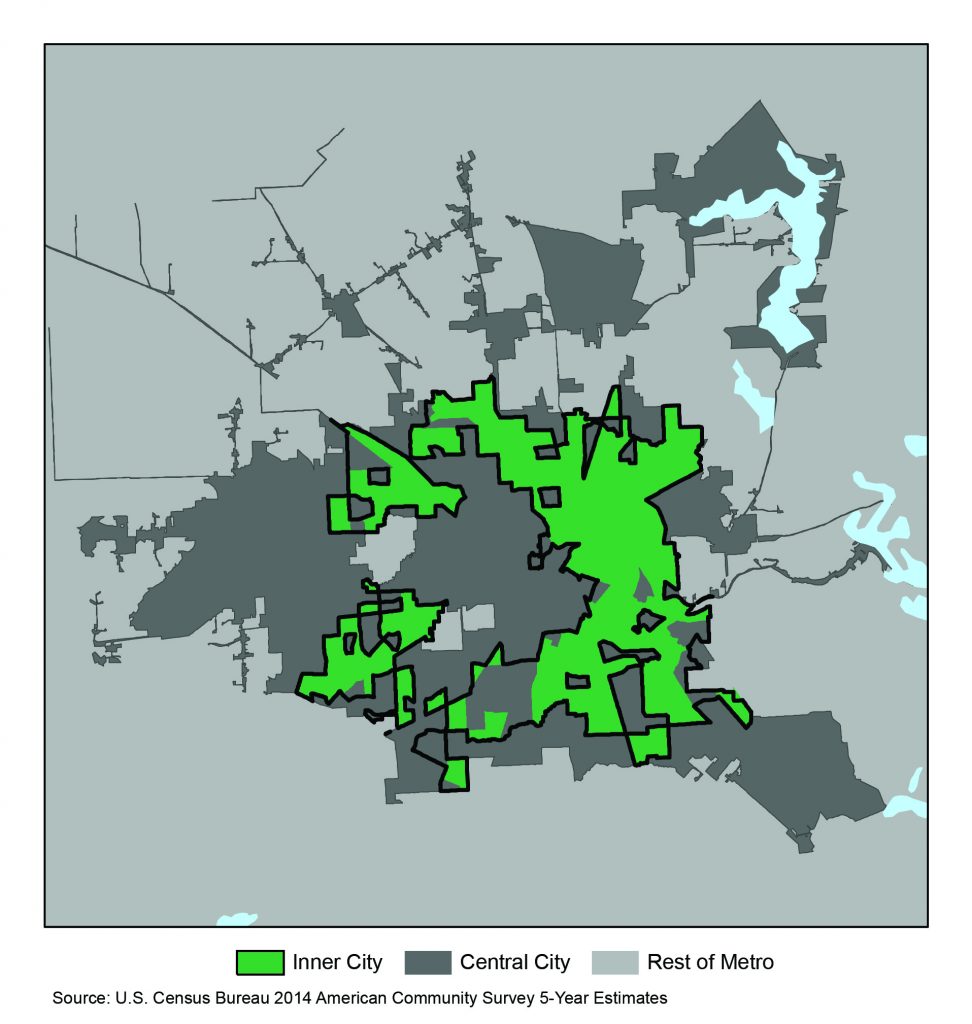Back

Blog
#CityCloseUp, Houston: As Houston Faces an Uncertain Future, What Lies Ahead for its Inner City?
Written by Juliet Downie
Houston, Texas—America’s fourth-largest city and its fastest-growing in 2015—is a vast metropolis whose economy is built on the oil and gas industries, manufacturing, healthcare, aerospace, and information technologies. Houston experienced high economic growth in the past decade, but its inner city did not benefit from this rising wealth. Since 2014, a fall in oil prices has caused a downturn in the city, leading some to worry about Houston’s future and its continued reliance on the oil industry. The decline in oil prices led to a drop in drilling and a loss of 30,000 jobs in 2015. Houston’s job growth rate slowed dramatically in 2015, and recently ranked among the slowest in the nation. If the inner city did not improve when Houston’s economy was booming, how will it respond to a city-wide slump?

ICIC’s analysis indicates that 42 percent of Houston’s population lived in its inner city in 2014, an eight percent drop from 2009. Several census tracts that met our criteria for the inner city in 2009 no longer qualify in 2014. Despite these improvements, economic conditions in inner city tracts worsened across the five years. Inner city poverty rose from 31 percent in 2009 to 35 percent in 2014, and inner city unemployment increased from 10 percent to 12 percent over the same period. Our map shows that the inner city covers a significant portion of Houston’s large land area, especially on the eastern side of the city, and accounts for close to half of its population.
Efforts to drive economic development have long been a focus of Houston’s private sector leaders, but few have targeted the inner city. The Greater Houston Partnership is a network of more than 1,200 companies in the 11-county Houston area that works to drive economic prosperity through business growth. The Partnership’s Upskill Houston initiative addresses the skills gap in the city by providing workforce development programs to attract, train, and employ workers in middle skills careers across seven targeted industries. These jobs require more than a high school diploma, but less than a four-year college degree. Upskill Houston partners with industry, community, and educational institutions to identify workforce needs and develop pipeline programs that connect local residents to careers. While this initiative does not specifically target inner city residents, it identifies Houston’s rising poverty rate and high employment rate among minorities—who reside in the inner city at a disproportionately high rate—as key challenges that it seeks to address through its workforce development, training, and connection programs.
Houston’s University of Texas MD Anderson Cancer Center is also working to increase procurement spending with small and disadvantaged businesses. As highlighted in a What Works for Cities Case Study, MD Anderson has committed to including HFSBs in procurement spending through its Historically Underutilized Business (HUB) and Federal Small Business (HFSB) Program. MD Anderson specifically targets increased procurement from HUB-certified small, minority- and women-owned businesses. Its mentor-protégé program connects these HUBs with larger suppliers, helping them grow and build long-term connections to the healthcare industry.
Incubators and accelerators have also been important supporters of small business growth in Houston. The Houston Technology Center (HTC), the largest technology business incubator and accelerator in Texas, has provided mentoring and capital matchmaking to businesses in the information technology, analytic instruments, and aerospace clusters since 1999. As we documented in a What Works for Cities Case Study, HTC has been a key driver of economic growth in Houston, aiding more than 300 companies that have created over 5,000 jobs and $2.5 billion in capital. Also noteworthy is the Houston Minority Supplier Diversity Council (HMSDC), a nonprofit private-sector coalition whose members include Minority Business Enterprises (MBEs) and major corporations. HMSDC helps businesses become MBE certified and connects them to customers and suppliers, and its MBE Accelerator promotes business growth through training and consulting.
ICIC has identified Houston as an important site for inner-city small business development. Houston is one of eight cities nationwide that will host a 2016 Inner City Capital Connections (ICCC) one-day seminar and serve as a regional center for the program, which supports the growth of inner-city businesses through education, mentoring, and access to capital. In addition, our 2015 Inner City 100 program identified four Houston businesses as among the 100 fastest growing inner-city companies across the nation. One of these businesses, Xcution, is closely tied to Houston’s energy industry. It provides performance management and leadership development services to oil and gas companies, and it strives to support other local businesses by encouraging its clients to seek procurement and sourcing from local companies.
The Neighborhood Recovery Community Development Corporation (NRCDC) is a leading example of the comprehensive approach some organizations in Houston are taking to tackle inner city challenges.
NRCDC offers programs in economic development, affordable housing, small loans, education, and community engagement to residents of inner-city neighborhoods, with a focus on Houston’s Third Ward. As part of its economic development initiatives, NRCDC developed the Renaissance Center, a 100,000 square-foot space in the Third Ward that houses retail, medical, and community service businesses and employs more than 375 people. NRCDC is also working with other community groups to steer the Old Spanish Trail Corridor Initiative, a project that aims to drive commercial development along Houston’s Old Spanish Trail corridor.
As Houston bears the impacts of low oil prices and faces uncertain economic times ahead, it is likely that poverty and unemployment will continue to deepen in its inner city. Efforts to promote sustainable growth and prosperity throughout Houston should include plans to drive economic development and employment in its most distressed neighborhoods. It is even more important than ever for public- and private-sector leaders to develop an economic growth strategy for Houston’s inner city.
